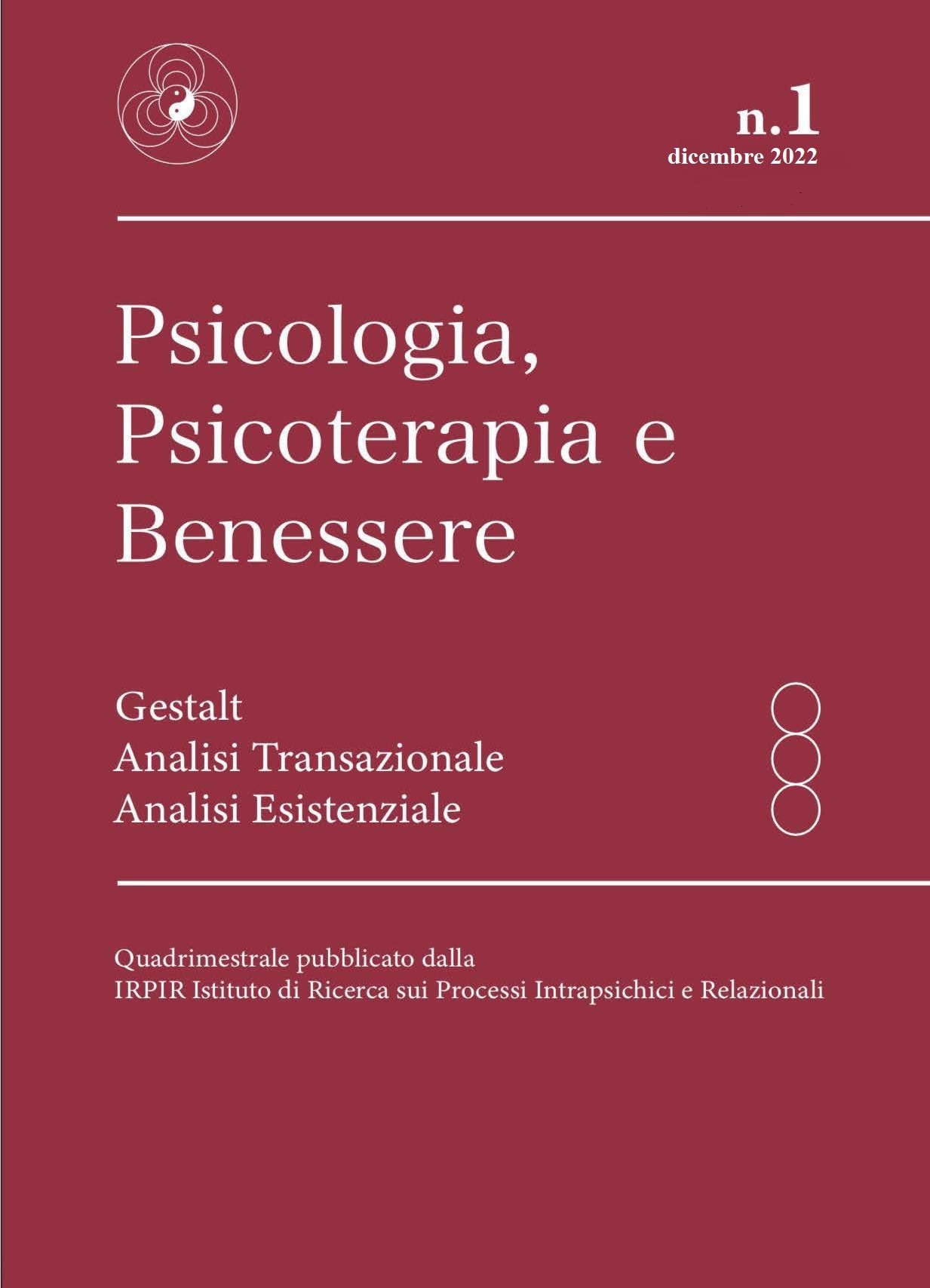Il dialogo morale in Psicoterapia
Keywords:
Moral dialogue, Psychotherapy, Code of ethicsAbstract
Cure and responsibility in psychotherapy comprehend a re-consideration of the moral dimension in the client-psychotherapist relationship. An approach is proposed which aims to enrich therapy through a dialogue on the development of morality. Morality, seen as a dimension which is linked to the overall development of a person and to her affective experiences, is recently studied and researched as an essential part of personal identity. The theoretical framework of the social-cognitive transactional analysis (SCTA) helps consider the moral sense development as an aspect founded on experiences, feelings, thoughts and evaluations which belong, in diverse ways, to the Child, the Adult and the Parent. With that, SCTA offers really interesting cues to those therapists who want to involve themselves, with respect, curiosity and sensitivity, in a dialogue which support the moral growth of their clients.
References
Berne, E. (1961). Transactional Analysis. A systematic individual and social psychiatry. Grove Press, New York.
Berne, E. (1964). Games people play. Grove Press, New York.
Bianchini, S., de Nitto, C. (2019). The Parent Ego State as a Developmental Achievement: a View from Social-Cognitive Transactional Analysis. Transactional Analysis Journal, 49, 1, 14-31
Boszormenyi-Nagy, I. (1987). Foundations of Contextual Therapy. Brunner/Mazel, New York, 1987.
Bucci, W. (2001). Pathways to emotional communication. Psychoanalytic Inquiry, 21: 40-70.
Cigoli, V. (1999). Il patto infranto [The broken agreement]. In: Andolfi, M. (Ed.), La crisi della coppia [The couple’s crisis]. Raffaello Cortina Editore, Milano
De Luca, M.L., Tosi, M.T. (2011). Social-Cognitive Transactional Analysis: an introduction to Pio Scilligo’s model of ego states. Transactional Analysis Journal, 41, 206-218.
Doherty, W. J.(1995). Soul Searching. Why Psychotherapy Must Promote Moral Responsibility. Basic Books, A Division of Harper Collins Publishers, Inc.
Doherty, W. J. (2009), Morality and Spirituality in Therapy, in: Walsh, F. (Ed.). Spiritual Resources in Family Therapy. 2nd edition (pp.215-228). New York: W.W. Guilford
EATA Ethical Code 2007/2011. https// www.eatanews.org/
Higgins, E.T. (2006). Value from Hedonic Experience and Engagement. Psychological Review, 113, 3, 439-460
Hoffman, M.L. (2000). Empathy and Moral Development. New York: Cambridge Un. Press.
Hume, D. (1739-40). A Treatise of Human Nature. Oxford: Clarendon Press. Retrieved 30 June 2014.
Kandhatil, G. & Kandhatil, C.(1997). Autonomy: Open door to spirituality. Transactional Analysis Journal, 27, 24-29.
Kohlberg L., Kramer, R. (1969). Continuities and discontinuities in childhood and adult moral development. Human Development, 12: 93-120
Lecaldano, E. (2006). Un’etica senza Dio [An ethics without God]. Gius. Laterza & Figli.
Lecaldano, E. (2010). Prima lezione di filosofia morale. Editori Laterza.
Levin, P. (1984). The cycle of development. Transactional Analysis Journal, 12, 129-139.
Locke, J. (1690). An essay Concerning Human Understanding. 1st ed. 1 vols. London: Thomas Bassett
Luborsky, L. & Crits-Christoph, P. (1990). Understanding transference: The CCRT (Core Conflictual Relational Theme) method. New York: Basic Books
Mahler, M. S. & Furer, M. (1968). On human symbiosis and the vicissitudes of individuation. New York: International Universities Press.
Mc Adams, D. P., Josselson, R., Lieblich, A., (2006). Identity and Story. Washington: APA.
Reda, M. A. (1986). Sistemi cognitivi complessi e psicoterapia [ Complex cognitive systems and psychotherapy]. Carocci Editore
Scilligo, P. (2005). La nuova sinfonia dei molti Sé. Roma:LAS
Scilligo, P. (2009). Analisi transazionale socio-cognitiva [The social-cognitive transactional analysis]. Roma: LAS.
Strohminger, N. & Nichols, S. (2014). The essential moral self. Cognition, 131, 159-171.
Strohminger, N. & Nichols, S. (2015). Neurodegeneration and Identity. Psychological Science. 26, 9, 1469-1479.
Tosi, M. T. (2010). The lived and narrated script: An ongoing narrative construction. In Erskine, R. G. (Ed.) Life scripts: A transactional analysis of unconscious relational patterns (pp. 29-54). London: Karnac Books.
Tosi, M. T. ( 2016). Social-cognitive transactional analysis: from theory to practice. In Erskine, R. G. (Ed.) Transactional Analysis in Contemporary Psychotherapy. (pp. 229-255). London: Karnac Books.
Tosi, M.T. (2018). Personal Identity and Moral Discourse in Psychotherapy. Transactional Analysis Journal, 48, 2, 139-151
Trautmann, R., L. (2003). Psychotherapy and Spirituality. Transactional Analysis Journal, 33, 1, 32-36.
Westen, D. (1990). The Relations Among Narcissism, Egocentrism, Self-Concept, and Self-Esteem: Experimental,Clinical, and Theoretical Considerations. In: Psychoanalysis and Contemporary Thought, 13, pp.185-241.
Whiting, J. B., Nebeker,R. S., Fife, S. T. (2005). Moral Responsiveness and Discontinuity in Therapy: A Qualitative Study. Counseling and Values, Oct. 2005, Vol. 50
Zelazo, P.D. (2004). The Development of Conscious Control in Childhood. Trends in Cognitive Science, 8, 12-17
Downloads
Published
How to Cite
Issue
Section
License
Copyright (c) 2022 PSICOLOGIA, PSICOTERAPIA E BENESSERE

This work is licensed under a Creative Commons Attribution-NonCommercial 4.0 International License.






